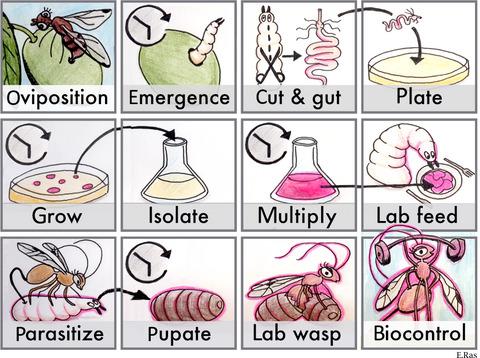当前位置:
X-MOL 学术
›
Entomol. Exp. Appl.
›
论文详情
Our official English website, www.x-mol.net, welcomes your
feedback! (Note: you will need to create a separate account there.)
The impact of fruit fly gut bacteria on the rearing of the parasitic wasp Diachasmimorpha longicaudata
Entomologia Experimentalis et Applicata ( IF 1.4 ) Pub Date : 2020-06-19 , DOI: 10.1111/eea.12936 Panagiota Koskinioti 1, 2 , Erica Ras 1 , Antonios A. Augustinos 1, 3 , Leo W. Beukeboom 4 , Kostas D. Mathiopoulos 2 , Carlos Caceres 1 , Kostas Bourtzis 1
Entomologia Experimentalis et Applicata ( IF 1.4 ) Pub Date : 2020-06-19 , DOI: 10.1111/eea.12936 Panagiota Koskinioti 1, 2 , Erica Ras 1 , Antonios A. Augustinos 1, 3 , Leo W. Beukeboom 4 , Kostas D. Mathiopoulos 2 , Carlos Caceres 1 , Kostas Bourtzis 1
Affiliation

|
Area‐wide integrated pest management strategies against tephritid fruit flies include the release of fruit fly parasitic wasps in the target area. Mass rearing of parasitic wasps is essential for the efficient application of biological control strategies. Enhancement of fruit fly host fitness through manipulation of their gut‐associated symbionts might also enhance the fitness of the produced parasitic wasps and improve the parasitoid rearing system. In the current study, we added three gut bacterial isolates originating from Ceratitis capitata (Wiedemann) and four originating from Bactrocera oleae (Rossi) (both Diptera: Tephritidae) to the larval diet of C. capitata and used the bacteria‐fed larvae as hosts for the development of the parasitic wasp Diachasmimorpha longicaudata (Ashmead) (Hymenoptera: Braconidae). We evaluated the effect of the bacteria on wasp life‐history traits and assessed their potential use for the improvement of D. longicaudata rearing. Enterobacter sp. AA26 increased fecundity and parasitism rate and accelerated parasitoid emergence. Providencia sp. AA31 led to faster emergence of both male and female parasitoids, whereas Providencia sp. 22 increased the production of female progeny. Bacillus sp. 139 increased parasitoid fecundity, parasitism rate, and production of female progeny. Serratia sp. 49 accelerated parasitoid emergence for both males and females and increased production of female progeny. Klebsiella oxytoca delayed parasitoid emergence and Enterobacter sp. 23 decreased parasitoid fecundity and parasitism rate. Our findings demonstrate a wide range of effects of fruit fly gut symbionts on parasitoid production and reveal a great potential of bacteria use towards enhancement of parasitic wasp rearing.
中文翻译:

果蝇肠道细菌对寄生蜂 Diachasmimorpha longicaudata 饲养的影响
针对实蝇实蝇的大面积综合虫害管理策略包括在目标区域释放寄生果蝇的黄蜂。大量饲养寄生蜂对于生物防治策略的有效应用至关重要。通过操纵与肠道相关的共生体来增强果蝇宿主的适应性也可能增强产生的寄生蜂的适应性并改善寄生蜂饲养系统。在目前的研究中,我们将源自头角角螟(Wiedemann)的三种肠道细菌分离物和源自油蜡实蝇(Rossi)(均为双翅目:实蝇科)的四种肠道细菌分离株添加到头尾螟的幼虫饮食中,并使用细菌喂养的幼虫作为宿主用于寄生蜂 Diachasmimorpha longicaudata (Ashmead)(膜翅目:蜂科)的发育。我们评估了细菌对黄蜂生活史特征的影响,并评估了它们在改善 D. longicaudata 饲养方面的潜在用途。肠杆菌属 AA26 增加了繁殖力和寄生率并加速了寄生蜂的出现。普罗维登西亚 AA31 导致雄性和雌性寄生蜂更快出现,而Providencia sp. 22 增加了雌性后代的产量。芽孢杆菌 139 增加了寄生蜂的繁殖力、寄生率和雌性后代的产量。沙雷氏菌 49 加速了雄性和雌性寄生蜂的出现,并增加了雌性后代的产量。催产克雷伯菌延迟寄生物出现和肠杆菌属。23 降低寄生蜂的繁殖力和寄生率。
更新日期:2020-06-19
中文翻译:

果蝇肠道细菌对寄生蜂 Diachasmimorpha longicaudata 饲养的影响
针对实蝇实蝇的大面积综合虫害管理策略包括在目标区域释放寄生果蝇的黄蜂。大量饲养寄生蜂对于生物防治策略的有效应用至关重要。通过操纵与肠道相关的共生体来增强果蝇宿主的适应性也可能增强产生的寄生蜂的适应性并改善寄生蜂饲养系统。在目前的研究中,我们将源自头角角螟(Wiedemann)的三种肠道细菌分离物和源自油蜡实蝇(Rossi)(均为双翅目:实蝇科)的四种肠道细菌分离株添加到头尾螟的幼虫饮食中,并使用细菌喂养的幼虫作为宿主用于寄生蜂 Diachasmimorpha longicaudata (Ashmead)(膜翅目:蜂科)的发育。我们评估了细菌对黄蜂生活史特征的影响,并评估了它们在改善 D. longicaudata 饲养方面的潜在用途。肠杆菌属 AA26 增加了繁殖力和寄生率并加速了寄生蜂的出现。普罗维登西亚 AA31 导致雄性和雌性寄生蜂更快出现,而Providencia sp. 22 增加了雌性后代的产量。芽孢杆菌 139 增加了寄生蜂的繁殖力、寄生率和雌性后代的产量。沙雷氏菌 49 加速了雄性和雌性寄生蜂的出现,并增加了雌性后代的产量。催产克雷伯菌延迟寄生物出现和肠杆菌属。23 降低寄生蜂的繁殖力和寄生率。











































 京公网安备 11010802027423号
京公网安备 11010802027423号